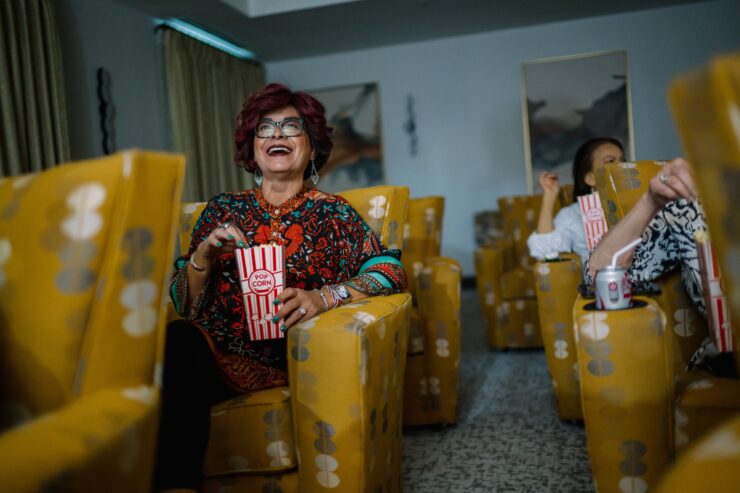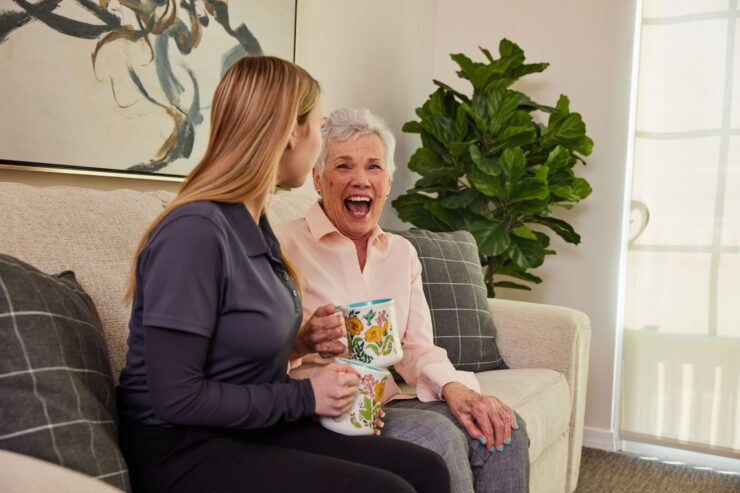
Why pride matters: celebrating Pride Month by understanding family of choice and LGBTQ+ senior living
ShareEvery June, Pride Month answers why pride matters as it ushers in a time of both reflection and celebration as the world recognizes the contributions and impact of the Lesbian, Gay, Bisexual, Transgender, Queer + (LGBTQ+) community across the world. Tribute joins in this celebration of its LGBTQ+ residents, caregivers, team members, friends and visitors by remaining committed to offering an open and inclusive environment where everyone can feel supported and respected, irrespective of their sexual orientation or gender identity. At Tribute, everyone is equally important and we honor individual choice.
We at Cogir Senior Living also want you to know that we celebrate you, we know why pride matters in LGBT senior care, and we want to share with others some of the unique ways LGBTQ+ seniors have built family structures and support systems as they have aged. As attitudes and feelings around gender fluidity change and become more mainstream, caregivers and communities are better understanding the importance that family of choice can have over family of origin. Cogir Senior Living welcomes and celebrates the chosen families of our elder LGBT residents, and we believe it’s important to educate others on just how critical those chosen family relationships can be.
Aging with pride
Adults 65 years and older are the fastest growing segment of the U.S. population. According to a February 2021 Gallup Survey, those who identify as lesbian, gay, bisexual or transgender rose from 4.5% of the U.S. population in 2017 to 5.6% in 2021. When you factor in romantic relationships, and nonbinary genders, some estimate that number as more than double.
The LGBTQ community is growing in the United States. With 1 in 6 Gen Z adults identifying as LGBT, fluidity in sexual identity and orientation has been embraced with open arms in younger generations and it is a natural aspect of their culture; thanks to all the hard, tireless work done by adults 50 and over. And yet, among their peers, the challenges elder LGBT Americans have faced all their lives can continue into their retirement years.
The LGBT senior is twice as likely to be single and live alone, and three to four times less likely to have children. These statistics have changed dramatically over the last 10-20 years, with more and more same sex couples raising children and growing families. But for today’s LGBTQ+ seniors – who fought bigotry and may have ostracized family by coming out of the closet during decades when it was less acceptable to do so – the probability is higher that they are aging alone. Isolation can be one of the most devastating issues in aging, including LGBTQ healthcare issues. Even for those who are lucky enough to have their partners by their sides, many states still have outdated laws that prevent same-sex couples or other family of choice from being seen as family when it comes to healthcare and legal documents that family might attend to on behalf of an aging loved one.
What is a family of choice?
Another of the LGBTQ healthcare issues many healthcare providers are beginning to recognize the role of family of choice. What does family of choice mean? Though there’s no single family of choice definition, a family of choice includes the people you choose to be your family as opposed to the biological family or family of origin. Some refer to these family members as their chosen family, elective kin or adoptive families. Family of choice reflects the individual choice of an individual rather than a relationship that was assigned at birth. So what is a Family of Choice? It’s an intentional connectedness between individuals who choose to adopt this kind of family structure. In some instances, a LGBT senior’s family of choice provides the physical and emotional support their family of origin cannot – or will not – provide.
Some point to anthropologist Kath Weston’s 1991 Families We Choose: Lesbians, Gays, Kinship as first popularizing the phrase family of choice as it relates to the LGBTQ+ community. Many, however, recognize that the 1980s was a time of change in the way family was defined in the LGBT+ community – especially in light of the AIDS crisis and the lack of recognition of non-traditional family relationships and how that was linked to one of the biggest LGBTQ healthcare issues of all time.
Even today – despite decades of progress – the United States still lacks legal safeguards that recognize the legitimacy of family of choice relationships, which means many same sex partners are denied access or visitation rights to their partner in a hospital or senior living community. That’s another reason finding a healthcare provider or senior living community that demonstrates culturally competent care is so critically important to those facing LGBTQ healthcare issues today and when considering LGBTQ and healthcare rights.
LGBTQ how to be an ally
When it comes to healthcare for the LGBTQ, how to be an ally should be a focus of senior living communities. Cogir Senior Living knows the importance of relationships to a resident’s wellbeing, and celebrates the family relationships of every resident – including chosen family members. For us, becoming an ally means providing an open, welcoming, safe space to live and love as well as providing culturally competent care that meets the needs of every resident.
Despite shifting attitudes and feelings toward the LGBTQ+ community, there are still inequities and disparity in the LGBTQ+ aging process. AARP reports 61% of LGBT+ individuals 45 years and older expressed fear of verbal or physical harassment when needing LGBT senior care. According to a Journal of Palliative Medicine study, that fear is warranted – and is why finding the right care for those with LGBTQ healthcare issues is vital.
Culturally competent care requires active identification and avoidance of perceived and unconscious biases on the part of caregivers. It requires an understanding of the terms used within the community and how to use them respectfully. And it requires an understanding of both gender identity and sexual orientation to best understand individual LGBT senior care needs.
Those who provide culturally competent care for LGBTQ healthcare issues must also understand that a LGBT senior has a higher risk for mental health concerns and provide safe spaces to discuss both physical and mental health concerns, without assumptions driven by appearance or cultural biases. Providing care to transgender seniors, for example, can be complicated, but providing non-biased healthcare that respects their wishes and makes them feel safe and included is a hallmark of culturally competent care.
As we age, we necessarily become reliant on others to support and care for us. Having access to family and friends who support and love them can lead to better mental and physical health. And having caregivers who provide LGBT senior care with empathy and who create safe spaces in the provision of care is critical to the long-term mental and physical health of LGBTQ+ individuals.
At Cogir Senior Living, we strive not only to provide culturally competent care, but to welcome and celebrate LGBTQ+ residents, family members and family of choice because we know how much these family members contribute to overall well-being. Cogir’s goal is for all residents to experience daily moments of joy – and to achieve that, we must all be fearless in the pursuit of equity and culturally competent care.
Liked what you read?
Spread the word!
Share
Related News

Boutique, luxury senior living
Luxury, boutique living reflects a growing shift in how older adults and families think about care, comfort…

Why private pay senior living offers more value than you think
Many families begin their search assuming private-pay senior living is too expensive. That reaction is…

Heartfelt holidays: Easy recipes for seniors, lasting memories
With the holidays right around the corner, there can be a lot to prepare for. Whether it’s shopping…
